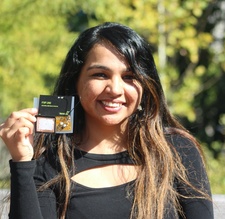Informatics Seminar: Building Sustainable Computational Materials

Abstract: We are rapidly moving towards a world with a trillion internet-connected devices, from smartwatches to industrial sensors. However, computing has yet to disappear into everyday objects and surfaces we interact with, as Mark Weiser envisioned 30 years ago. Today's Internet of Things (IoT) devices are bulky, expensive, and battery-powered, making them environmentally harmful and heavily reliant on regular maintenance and replacement. Four system design challenges keep us from building functional, integrated, and low-impact ubiquitous computational things: form factor, maintenance-free power operation, low-cost, and environmental sustainability.
With this vision in mind, I build sustainable computational materials by rethinking the computing stack from the bottom up, going beyond off-the-shelf device components, and co-designing across novel materials, fabrication methods, low-power circuits, and industrial design. To illustrate this, I will provide an example of an easy-to-retrofit, inexpensive, battery-free sticky note that can wirelessly sense acoustic vibrations and provide feedback. This work will encompass three projects with increasing capability. SATURN is a self-powered flexible acoustic sensor based on a triboelectric generator made from inexpensive everyday materials like paper and plastic. MARS demonstrates simultaneous wireless sensing of speech, direction, identity, and touch by multiple interactive stickers in an indoor environment in nano-power. VENUS adds feedback to the stickers in the form of a low-voltage display powered by the human body or ambient room light. I discuss the potential application of sustainable stickers in interaction sensing, mobile health, and infrastructure monitoring. I will conclude by laying a path forward for systems, toolkits, and applications that help progress the ambitious research agenda of sustainable computational materials throughout their full lifecycle - manufacturing, operation, and reuse or disposal.
Bio: Nivedita Arora is currently a postdoctoral researcher in the School of Interactive Computing at Georgia Institute of Technology with Dr. Josiah Hester. Her research envisions creating sustainable computational materials and things that operate by harvesting energy from the environment and, at the end of their life cycle, can be responsibly composted or recycled.